Mitral Valve Prolapse Replacement Surgery In Hyderabad
#Top 10 Heart Failure Surgeons in India

Mitral Valve Prolapse is a condition in which one or both of the mitral valve leaflets bulge into the left atrium. This condition is also known as click-murmur syndrome, floppy valve syndrome or balloon mitral valve
Mitral valve prolapse is type of heart valve disease and is often not life threatening.It can affect people of all ages. In some people, it is congenital. It is more common in women. In general, it affects about 2-3% of the population.
What is mitral valve?
Mitral Valve connects the two chambers of the heart (left ventricle & left atrium) responsible for collecting oxygen rich blood from the lungs & then pumping it to the entire body. It has two flaps of tissue known as cusps or leaflets. With each heartbeat, these leaflets open & close, while monitoring the blood flow out of left atrium & into the left ventricle.
What are the symptoms?
Common symptoms may include:
Shortness of breath with exercise or exertion
Swelling in feet and/or legs
Palpitations
Dizziness
Fainting
Anxiety
Tingling sensation in hands & Feet
What are the causes?
Mitral valve prolapse is caused by weakness in the valve tissue known as myxomatous degeneration. It is not known what exactly weakens the tissue. In some cases it is hereditary.
Can it lead to any complications?
In most cases, mitral valve prolapse is not harmful. However, in some individuals it can lead to mitral valve regurgitation. People who have both these conditions are more likely have complications like:
Heart failure
Infective endocarditis
Atrial Fibrillation
Ventricular Arrhythmias
How is it diagnosed?
Firstly your cardiologist is likely to perform a physical exam to check if the hear makes any clicking sound followed by a murmur. He or she will then ask about your family & personal medical history.
After the physical examination, your doctor would recommend the following tests to diagnose your condition.
Transthoracic Echocardiogram
Transesophageal Echocardiogram
Electrocardiography
Chest X Ray
Cardiac Catheterization
Can it be treated?
In most cases, treatment may not be necessary. In mild cases, the doctor may prescribe beta blockers to manage symptoms. If the patient has a history of atrial fibrillation or history of stroke, blood thinners may be recommended.
In some patients, mitral valve repair or mitral valve replacement may be necessary The treatment plan depends on many factors such as
Patient’s age
Patient’s health history
Patient’s current health condition
Whether the patient has other heart conditions
How to know if treatment is required?
Whether or not a patient needs valve repair or replacement depends on the following:
Whether symptoms are getting worse over time
Whether the patient has regurgitation
If the patient’s heart gets enlarged
If the patient develops an arrhythmia
If the heart can’t pump enough blood


